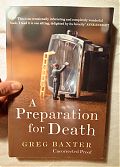
Greg Baxter
A Preparation for Death
Back in sweaty July I won A Preparation for Death on John Self’s site, Asylum. How exciting! And if it hadn’t been for the inconsistencies of the Italian post, I would have read it months ago. Alas, the book finally arrived early October, thanks to Penguin, who sent a second copy. John Self’s review inspired me to curiosity, for I thought, here is a book that seems to drip with raw honesty.
These are my weaknesses, and in my day-to-day life I conceal them, because I cannot defeat them. I am as much my weaknesses as my strengths. But to conceal them here, to myself, would be insanity. So I betray them. […] I do not write because I am honest; I write because I am dishonest.
A Preparation for Death is Greg Baxter’s autobiography, though it is quite far removed from traditional autobiography, in that it was written in the white heat of the experience. The book chronicles about a year in Baxter’s life, a transition between the self-destructive and the self-repairing. The resulting immediacy makes autobiography a weak description, like Tropic of Cancer —which was no doubt an influence—one pitches “genre” out the window.
It is the bare desperation that made A Preparation for Death extremely likable; I liked its bitterness and dreariness, its lasciviousness. But I have always admired those who rip their guts out as a spectacle in elegant language.
In a way, this book seems to have been written as a defense to failure: failed marriage, failed novelist. It buoys in its own quagmire. Greg Baxter destroys his body, he drinks and drinks, works, barely eats, doesn’t sleep, sleeps with his students and drinks with them. Dublin only impresses when it’s grey and rainy, and ugly when the sun shines. It is a life lived without expectation or ambition, for the first time.
What a foolish illusion. I spent many years trying to interpret existence, when I ought to have been squandering it. What is there to learn from life, except that it ends, and for a little while you are alive?
Perhaps I enjoyed A Preparation for Death most for its prying into writing. Greg Baxter had been writing for years before writing this book, his “debut.” He attended writer’s conferences, studied writing, he teaches it, and he believed he could “revolutionize fiction.” When he was younger he had ambition, considered himself above other American writers and fumed at other writers’ published popularity. Yet he was unable to get published. Many times during the text, Baxter dumps the fault on his ambition.
Ambition and writing is a curious combination. One can hardly begin envisioning a book without it, yet too much and the work becomes dishonest. Over and again, I am made to understand that one cannot create a reverberating work unless one is stripped with only bones to show. And that is the greatness of this book. What Greg Baxter wanted to achieve before with his drive and the expectation to crumble literature, he learned could only be accomplished without it. And that in the end, it barely matters.
The idea of writing as salvation is a common notion. What is more necessary then emerging from a bout of self-destruction? The real life of any book is that which is born into it by the writer, when the book itself becomes the lie detector. A book of faulty conviction is a dead book, and no one knows this better than its begetter.
For all the gloominess, A Preparation for Death is not a gloomy book. Its prose is fine and at moments, glistens with its own revelatory clarity. And I must believe that A Preparation for Death succeeded in more than what little its author expected.
I search for new books, new authors, to uncover more of my nature—some lost strains my habits and prejudices may suppress. I imitate; I repeat; and new selves emerge. Originality is not forged anew; it is borrowed.
· · · · · · · · · · · · · · · · · · · ·